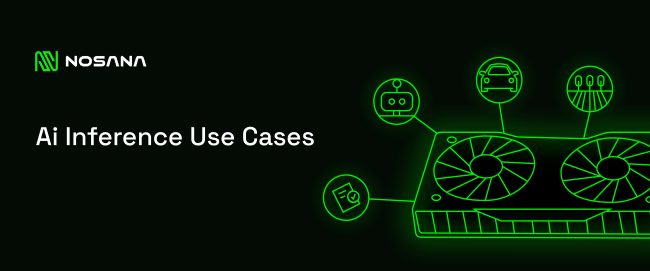March 8, 2024
How AI Inference Drives Business Applications in 2024

AI inference bridges the gap between complex AI models and their practical use cases.
AI inference, the process of applying trained AI models to real-world data, plays an important role in numerous applications across diverse industries. This article explores the concept of AI inference, its functionalities, and its impact on various sectors, including entertainment, business, agriculture, healthcare, and even security.
AI inference bridges the gap between complex AI models and their practical use cases. It makes these models applicable to real-world circumstances by transforming their knowledge into actionable insights. This process involves utilizing trained models to analyze and interpret live data, leading to various automated tasks or personalized experiences.
Applications:
Entertainment: Streaming services like Netflix use AI inference to determine consumer viewing habits and preferences. The end result is personalized recommendations, which boosts user engagement and retention.
Business: Deloitte's dTrax software utilizes AI inference to streamline contract management. It facilitates the identification and automatic update of key passages within legal documents, enhancing efficiency and accuracy.
Agriculture: AI models based on satellite photos and weather data are enabling farmers to maximize crop yield through accurate irrigation and fertilizer applications. Companies like the Climate Corporation are employing AI-powered solutions to assist farmers in making data-driven decisions and optimizing resource management, contributing to a more sustainable food production process.
Healthcare: Siemens Healthineers uses AI inference to speed up medical image processing, freeing up more time for healthcare personnel to focus on patient care. On top of that, AI inference offers the possibility of personalized medicine by assessing individual patient data to create customized treatment plans. Paige AI is another company that uses AI inference in healthcare, building systems to help pathologists in cancer diagnosis.
Autonomous Systems: AI inference is critical to the development of self-driving cars and drones. Companies such as Tesla are incorporating AI into the foundation of their autopilot systems, bringing us closer to fully autonomous driving. Modern autonomous systems can react instantly, eliminating human mistakes and improving transportation efficiency.
Security: Companies such as Deepwatch and Darktrace use AI inference to detect and respond to cyber attacks in real-time. AI models can detect anomalies and potential security breaches by studying network traffic and user activity, triggering proactive security measures to be swiftly implemented.
Climate Change: Improved climate change models, developed by machines evaluating massive amounts of historical climate data, have led to more accurate projections of future climate patterns. This innovation offers value for policymakers and scientists looking to make better judgments regarding climate action. DeepMind, for example, uses AI to study climate data and create models to help predict and mitigate the effects of climate change.
AI inference has a significant and sometimes invisible impact on molding our daily lives. This technology is altering multiple industries by providing effective data analysis, automation, and tailored experiences, ranging from entertainment platforms to commercial operations, healthcare improvements, and even security measures. As AI technology advances, we should expect to see even more innovative and valuable applications of AI inference in the future.
Unlocking the Power of AI Inference with Nosana
While AI inference has numerous advantages, implementation might be difficult due to the enormous processing resources required. Nosana is a decentralized GPU marketplace that provides a cost-effective and scalable solution. Companies can gain the processing capacity required to run their AI models by leveraging Nosana's decentralized network of idle GPUs, making it possible to save on infrastructure costs, scale their AI workloads, and focus on innovation.

